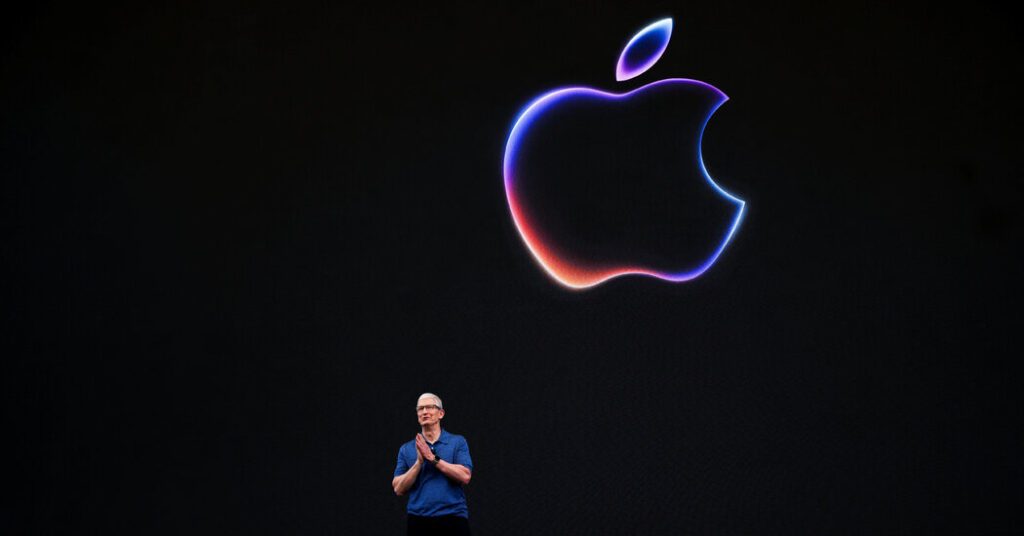Nearly two years after OpenAI ignited the race to build generative artificial intelligence into products, Apple entered the fray on Monday, announcing plans to make the technology available to more than 1 billion iPhone users around the world.
At the start of a two-hour presentation at its futuristic Silicon Valley campus, Apple revealed that it plans to use generative AI to power a system it calls Apple Intelligence, which will prioritize messages and notifications, provide writing tools that can proofread and suggest what users write in emails, notes and texts, and lead to major upgrades to Siri, Apple's virtual assistant.
As Apple unveiled its new AI features, it highlighted its plans to integrate the technology into its products in a privacy-conscious way.
The company says the technology, which can answer questions, create images and write software code, performs sensitive tasks like determining whether a rescheduled meeting time will interfere with your plans to go to a child's theater show on the iPhone rather than in a data center, where personal information is at higher risk of being leaked. For more complex requests, it uses Apple semiconductors to build a cloud network that not even Apple itself can store or access, providing more privacy.
“As we build these great new features, we want to ensure that the results reflect the core principles of our products,” said Apple CEO Tim Cook. “They should be powerful enough to help you do what matters most to you. They should be intuitive and easy to do.”
Apple said it will also make improvements to its iPhone software system. This fall, messaging will get the ability to schedule messages and tap to reply to messages with more emojis. It will also release a redesigned Photos app that makes it easier to browse images by topic, such as pets or travel. It will also let iPhone users send high-resolution images to Android smartphones.
Apple brings some advantages to the AI race: Its semiconductor team is one of the best in the industry, and it has years of experience building chips that power complex AI functions. The company also touts that it is better able to protect your personal information than rivals, because it makes money from device sales rather than advertising.
But Apple has some weaknesses that could slow AI development: The secretive company has struggled to recruit and retain top AI researchers because it limits how much research it publishes, and it has also sought to license published materials and opposed harvesting them without permission, as other generative AI companies have done to build and train their technology.
To address Apple's shortcomings, the company has inked a deal with OpenAI to provide generative AI technology to help it overcome its own shortcomings, according to two people familiar with the deal. OpenAI Chief Executive Sam Altman was at the Apple event.
Siri has been around for over a decade, but Apple has neglected the voice assistant, frustrating users with its inability to recognize various requests and limited ability to actually converse with it, as it's programmed to follow individual commands.
Generative AI has the potential to improve Siri's capabilities because it is trained on conversations extracted from podcasts and videos, resulting in a system that can mimic the way humans speak.
Apple said Siri will be able to remember the context of what you ask — for example, if someone asks about the weather in Muir Woods National Monument and then asks to plan a hike there, Siri will know that the planned hike will take place in Muir Woods.
Siri will be able to better understand what you want to do in your iPhone apps: for example, if you ask Siri to show you photos of your friends, it will find and display them in the Photos app, or it will be able to find a picture of your driver's license to fill out forms and do other things.
Apple's push into generative AI was partly to play to Wall Street investors. The technology has boosted the value of Microsoft, a leader in generative AI, and Nvidia, which sells AI chips. Earlier this year, Microsoft overtook Apple to become the world's most valuable technology company.
“This is the biggest event for investors since the iPhone, because to be successful they need to build AI into their products,” said Gene Munster, managing partner at Deepwater Asset Management, which invests in emerging technology companies. “Today was about showing they can make AI a core competency and deliver the AI experience that consumers want.”
The event marked an important milestone in Apple's relationship with developers. Tensions have been building between the company and app makers for the past year as the company resisted new rules enacted in Europe to weaken its grip on the App Store. The rules would require Apple to allow alternative third-party payment methods that would allow developers to avoid the 30% commission it charges on app sales. But Apple fought back by introducing alternatives that would make such changes cost-prohibitive.
Apple faces similar challenges in the U.S., where a federal judge in San Jose, California, is considering whether the company can go ahead with a plan to collect a 27% cut of sales on alternative payment systems, and the Department of Justice has also sued Apple over rules that bar other companies from offering alternatives like cloud-streaming gaming apps and digital wallets on the iPhone.
Against this backdrop, Apple has sought to highlight the benefits it offers to developers.
Apple has announced that it will expand sales of its Vision Pro mixed reality headset to China, Japan and Europe beyond the US later this month. The company also unveiled new features for the headset, including the ability to view old photos in 3D and create a giant virtual display for your Mac.

